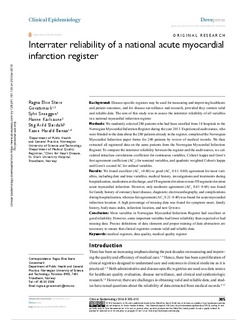Interrater reliability of a national acute myocardial infarction register
Slørdahl, Stig Arild; Bønaa, Kaare; Karlsaune, Hanne Margrethe Thyrmer; Sneeggen, Sylvi Fredriksen; Govatsmark, Ragna Elise
Journal article, Peer reviewed
Permanent lenke
http://hdl.handle.net/11250/2434938Utgivelsesdato
2016Metadata
Vis full innførselSamlinger
Sammendrag
Background: Disease-specific registers may be used for measuring and improving healthcare and patient outcomes, and for disease surveillance and research, provided they contain valid and reliable data. The aim of this study was to assess the interrater reliability of all variables in a national myocardial infarction register.
Methods: We randomly selected 280 patients who had been enrolled from 14 hospitals to the Norwegian Myocardial Infarction Register during the year 2013. Experienced audit nurses, who were blinded to the data about the 280 patients already in the register, completed the Norwegian Myocardial Infarction paper forms for 240 patients by review of medical records. We then extracted all registered data on the same patients from the Norwegian Myocardial Infarction Register. To compare the interrater reliability between the register and the audit nurses, we calculated intraclass correlations coefficient for continuous variables, Cohen’s kappa and Gwet’s first agreement coefficient (AC1) for nominal variables, and quadratic weighted Cohen’s kappa and Gwet’s second AC for ordinal variables.
Results: We found excellent (AC1 >0.80) or good (AC1 0.61–0.80) agreement for most variables, including date and time variables, medical history, investigations and treatments during hospitalization, medication at discharge, and ST-segment elevation or non-ST-segment elevation acute myocardial infarction. However, only moderate agreement (AC1 0.41–0.60) was found for family history of coronary heart disease, diagnostic electrocardiography, and complications during hospitalization, whereas fair agreement (AC1 0.21–0.40) was found for acute myocardial infarction location. A high percentage of missing data was found for symptom onset, family history, body mass index, infarction location, and new Q-wave.
Conclusion: Most variables in Norwegian Myocardial Infarction Register had excellent or good reliability. However, some important variables had lower reliability than expected or had missing data. Precise definitions of data elements and proper training of data abstractors are necessary to ensure that clinical registries contain valid and reliable data.

